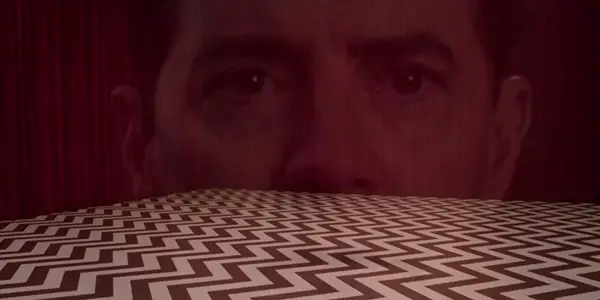Transcendental Meditation Through the Films of David Lynch

Author of SIMPLY THE BEST: INTERVIEWS WITH VIDEO GAME DESIGNERS,…
Like so many things in life, David Lynch‘s filmography is an acquired taste. He’s written and directed 10 surrealistic features navigating the gamut of genres from sci-fi epic (Dune) to murder mystery (Blue Velvet, Twin Peaks: Fire Walk with Me) and biopic (The Elephant Man, The Straight Story). However, Lynch is known for more than his cinematic works; he’s been a practitioner of transcendental meditation, now more commonly known as TM, since 1973. We’re going to explore how Lynch‘s otherworldly sound design expresses key maxims of transcendental meditation.
Started in 1955 by Maharishi Mahesh Yogi, TM has come a long way, blossomed in popularity to be embraced by millions around the world. As Maharishi spread the word of TM through global tours, its chill vibes and peaceful mission appealed to The Beatles and The Beach Boys in the 1960s and 1970s; even Life Magazine declared 1968 the Year of the Guru.
Studies have proven TM to help with PTSD, self-development, and leadership. Hugh Jackman (Les Misérables, The Greatest Showman) described its benefits as changing his life, noting “some of the clearest ideas or epiphanies I’ve had in life happened during or after meditating. Everything becomes clear and the truth starts coming out.”
Lynch‘s exposure to TM occurred before he completed work on his first feature Eraserhead; it’s been influencing his flicks ever since.
Breathe It In
In Twin Peaks: The Return, Agent Dale Cooper (Kyle MacLachlan) sits in the Black Lodge in utter silence wondering what is to become of his ultimate fate. Nikki Grace (Laura Dern) ventures through Los Angeles in a surrealistic haze, not certain of where she’s going in Inland Empire. All we hear is ragged breathing veering between deep breaths and hoarse gulps. Getting your breathing rhythms right for meditation is an acquired skill; go too fast or too slow, and you might be distracted.

Lynch‘s focus on long nearly silent scenes with characters breathing in, methods both mannered and not, makes one wish the characters would pop out for 20 minutes, practice a spot of TM, and calm the hell down. His characters’ lives are often upended in a most severe way whether it’s from a grisly surprise (Jeffrey Beaumont finding a human ear in a field in the memorable opening of Blue Velvet) or a family crisis (Alvin Straight discovering his brother has suffered a stroke in The Straight Story).
Curiouser and Curiouser
Mantras abound if you know where to find them. After attending a party, Fred Madison (Bill Pullman) is approached by a Mystery Man (Robert Blake) who insists “We’ve met before, haven’t we?” A mantra can be familiar or alien, but can also be comforting through its repetition as if it was always meant to be in your life in the first place.
After graduating from the entry-level four-session TM course, students are given a sacred mantra to use while meditating. Repeating this in your head whilst meditating allows one to free the rest of their mind to devote themselves solely to the act of meditation.
In a memorable scene from Mulholland Drive, Rita’s quest for fame on the silver screen advances only when the name “Diane Selwyn” enters her head in a near-magical surreptitious manner. Mantras can come in mysterious ways.
Practice Makes Perfect
Meditation, above all else, has to be a habit for it to be most effective. In the original two seasons of Twin Peaks, FBI Agent Dale Cooper goes to the Double R Diner on the regular to order his damn fine coffee and slice of cherry pie that tastes like “where pies go when they die”. Does he need that double-barreled rush of sugar and caffeine to solve the mystery of who killed Laura Palmer (Sheryl Lee)? Sometimes when things taste so good, the wants outweigh the needs.

A decked out Sailor (Nicolas Cage) croons two Elvis songs about love to the fiery Lula (Laura Dern) in Lynch‘s under-appreciated Wild at Heart. Despite brief moments of shocking violence throughout the story, itself not an unusual Lynchian happening, the main message here is the power of love. Sailor and Lula make a habit of saying this over and over again to each other and acting upon.
Only by making meditation a regular practice in your life can one achieve greater potential. As David Lynch himself noted, every time you TM, “it enlarges the container […] When you come out, you come out refreshed, filled with energy and enthusiasm for life”.
Come Out and Radiate
Transcendental meditation can provide a wealth of benefits. One of them might just be a greater appreciation of film. David Lynch’s grand filmography can become the key to open the door.
Have any good thoughts on TM, David Lynch’s filmography, or the connections therein? Post your opinions in the comments below!
Does content like this matter to you?
Become a Member and support film journalism. Unlock access to all of Film Inquiry`s great articles. Join a community of like-minded readers who are passionate about cinema - get access to our private members Network, give back to independent filmmakers, and more.
Author of SIMPLY THE BEST: INTERVIEWS WITH VIDEO GAME DESIGNERS, COMPOSERS, AND SCOFFLAWS and THE FILMS OF UWE BOLL VOL. 1: THE VIDEO GAME MOVIES. Host of SEQUELCAST 2 AND FRIENDS.













